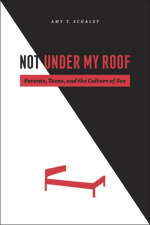For the past 14 years I’ve received email from t(w)eens around the world. 80% of them fictitiously sign their letters “Confused.” They’re confused about a whole lot of stuff, especially sex. It’s cool that they use their confusion as a motivator to ask questions of an adult (by most measures, that would be me). Otherwise, how are they going to understand what they need to know so they can make good choices?
Here’s one that came in last week from a young teen:
If a male only sticks the tip of his penis into a girls vagina, is it considered “having sex”?
The next day this one arrived:
I was walking with my partner and as a tease he held my leg from the top and I think his hand hit near my vaginal hole but he didn’t put his finger straight in and I moved. It was literally one second but I had my trousers on and it was just whilst I was walking. Any chance I can get pregnant with that? I’m very young and scared.
Don’t let their ignorance of mechanics distract you from the bigger picture: Too many t(w)eens seem to view sexual contact as a casual activity with no serious relationship or emotional closeness required. I fear those kids will have trouble developing bonds of real intimacy.
Last week’s Glee episode featured two in-love high school couples (one gay, one straight – all four teens were 12th graders), crossing the threshold in their long-term relationship and choosing to have sex for “The First Time.” Kudos to the writers for showing us characters sensitive to each other’s needs. Rarely on TV or in films do we see teens willing to put so much careful thought into decisions having to do with sex.
It got me thinking how American teens might make different choices if they had more role models for talking about sex with their partners… or even with their parents.
I know it sounds totally crazy to imagine teens having real conversations with their parents about serious relationships, but after reading Amy Schalet’s new book Not Under My Roof: Parents, Teens and the Culture of Sex I learned the American way isn’t the only way. If we can agree the goal is to prevent teen pregnancy and to help older teens “navigate the challenges of sexuality and first relationships” then, generally speaking, American parents and educators are doing a lousy job.
As Schalet’s book thoroughly documents, Dutch parents have a more open attitude about sex education which results in Dutch teens having less casual sex and far fewer pregnancies. They also sneak around less and experience much less alienation from their parents during these years. Wow! I didn’t know there was an alternative to teen alienation. My view is tainted by emails from teens who don’t like lying to their parents and aren’t particularly enjoying random hook-ups or “friends with benefits” arrangements. Bottom line, they don’t seem to be having all that much fun doing the stuff they’re sneaking off to do and yet, they’re doing it anyway and not necessarily learning anything positive.
I was eager to talk to the Amy about Not Under My Roof. We had a great conversation which included many eye-openers. Check this out: When asked about their first sexual experience, a majority of American girls said: “I wish I had waited longer.” That indicates regret for whatever reason. There’s also a possibility that the girls felt pressured to have sex when they didn’t really want to. When Dutch girls were asked a similar question, 85% said: “We both wanted it. We chose it.”
Very interesting.
Here are my big takeaways from my conversation with Amy Schalet, “One narrative doesn’t fit all.” When we give our teens only one message we:
- Fail to give them the education/guidance/space they need to make responsible choices about their own sexual behavior.
- Build unnecessary walls between us and our kids based on deception and distrust and the false assumption that we can control their behavior.
- Prevent them from a basic understanding of what it means to “be ready” to have sex. This is something only the individual can determine but the parent can help with these guidelines:
- the partner is trustworthy
- the time you’ve had in the relationship thus far
- you and your partner have talked about having sex and what crossing that threshold means to each of you
- you both want to have sex
- you understand it will change the relationship. You’ve thought about and talked about how might it change your feelings for each other. How might it also change your expectations, your behavior, your agreements?
Some of you may feel that teen sex is never ok. If so, then you’re in agreement with the American cultural narrative of “Just don’t do it.” Even if that is your perspective, the teens in your life will still benefit from your talking with them about sex and relationships. They’ll also appreciate your listening to what they have to say. They need to hear your values because by 19 years of age, 70% of young people have had sex. That’s reality. Since that’s where they’re going, you want them making conscious, healthy choices.
btw, in addition to reading Amy’s book, you might also want to check out my interview on FoxNews.com where I talk about Teen Sex in the Family Home.












